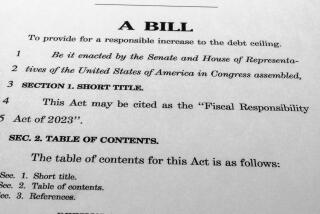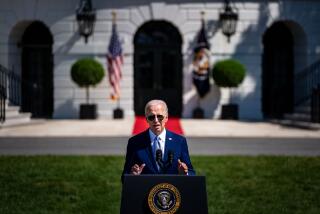Correcting the 43% Dilemma : Clinton gets by with the help of Republicans
- Share via
Approval by the House of the North American Free Trade Agreement on a surprisingly comfortable 234-200 vote has given President Clinton the most significant victory of his Administration. What just a few months ago seemed to be a lost cause was in the end transformed by vigorous and astute lobbying and ample logrolling into something that can fairly be regarded as both a political and a personal triumph.
Even some of Clinton’s most relentless Republican critics have rushed to salute his courage in challenging that majority of Democrats in the House who opposed NAFTA, as well as organized labor, which, fearing a major migration of jobs to Mexico, bitterly fought against the trade pact. An Administration that during its first 10 months has often appeared to be unsure of its principles and inept in its political skills proved here that it is capable of acting with commitment and boldness.
When all is said and done, however, the House’s endorsement of NAFTA was a true bipartisan victory, and credit for it must be shared with those Republicans whose votes put it over. When the roll was called late Wednesday night, only 102 of the 258 Democrats in the House stood with their President. And 132 Republicans voted for NAFTA, with only 43 opposed. Granted, NAFTA was negotiated under the GOP’s defeated leader, George Bush. But credit should still go to House Republicans, who had it in their power to hand Clinton a humiliating defeat and rightly and honorably rejected that temptation.
How lasting will the NAFTA-spawned bipartisan coalition prove to be? It could evaporate like the morning dew. It could, alternatively, re-emerge when other key issues that cut across party lines appear--most obviously, reform of the nation’s health-care system. Bill Clinton, as if he needed reminding, was the choice of only 43% of Americans who bothered to vote last year. A Washington outsider, he cannot count on the automatic loyalties of most Democrats in Congress. He will need Republican help on much of his legislative program. And he will need to continue to be cooperative in turn.
If Clinton was a clear political winner in the NAFTA battle, then surely Ross Perot was an unambiguous loser. Sensing victory early on, he made the fight against NAFTA a personal crusade, encouraging popular fears with his constant recitation of dubious numbers and vacuous bumper-sticker slogans. Perot, quite simply, fell on his face, although it would be foolish to conclude that the man who got nearly one in five of last year’s votes for President has become a has-been. Still, if the polls are right, esteem and support for the Texas billionaire are fast fading. That’s the second good thing to come out of the NAFTA fight.
More to Read
Get the L.A. Times Politics newsletter
Deeply reported insights into legislation, politics and policy from Sacramento, Washington and beyond. In your inbox twice per week.
You may occasionally receive promotional content from the Los Angeles Times.










